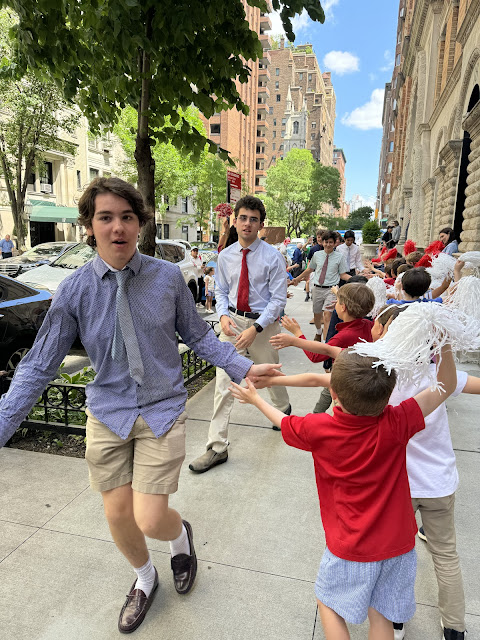“We want to rebuild, and to do it with your help.”
~ Aaron Fossi, representative from Save the Children, Saint David's partner in our Ethiopia Schools Initiative
Ten summers ago in June of 2014, I traveled with three young alumni who had served as Student Council Presidents (Colin Johnson ’11, Jack Mullin ’12, and Skakel McCooey ’13) to Tigray, Ethiopia, for the official opening of the Saint David's Kalina School. All of the money raised to build the new elementary school for Muslim boys and girls had come from the planning and fundraising conducted by our boys over three years, led by the eighth-grade student council under the guidance of their teacher, Tom Ryan. The boys conceptualized and ran a cornucopia of activities and events: walk-a-thons, pay-to-play sports, ice cream and t-shirt sales, and a not-to-be-missed trivia quiz show that pit teams of students against faculty and parents.The Ethiopia Schools initiative was the culmination of one of two major sixtieth-anniversary initiatives inspired by reflection on our mission’s imperative “that they be good men.” In celebrating our anniversary milestone, we wanted to do for others what others did for us by breathing life into two new programs. The first, Horizons at Saint David’s,* would serve underserved children close to home; the other would serve children far away. Both would involve education. The school, as an institution, would lead by example, illuminating its mission.Ever since, we have remained committed to educating children in Tigrayan communities in Ethiopia. In 2018, we helped build a second school located in Al'asa. In February 2020, I visited again, with a small contingent including Finn Hayden ’20 Student Council President at the time. The trip occurred just prior to the Covid shutdown.Tragically, in the years following our second visit, Ethiopia has suffered a devastating humanitarian crisis caused by the country's civil war, the pandemic, and a drought that has killed livestock, left 24.1 million people food insecure, and 10.8 million children in need of humanitarian assistance. Although the acute phase of the conflict has subsided, 80 percent of school facilities remain damaged, and only 40 percent of Ethiopian children are back in school. Most communities in Ethiopia's northern, southern, and southeastern regions are projected to face emergency or worse levels of food insecurity.
The schools we helped build were affected. Al'asa was bombed and partly destroyed during the internal conflict. Kalina, utilized as a hospital and shelter for displaced villagers, continues to be occupied by the military. Teachers and students in Tigray have been traumatized.When Mr. Fossi conducted this year's kick-off meeting with the eighth graders in Chapel, he elucidated the continuing challenges Ethiopian children face, thanking our boys for their steadfast commitment to the initiative and to rebuilding the school in Al'asa.
The need remains, and so will we. When we initiated this project in 2011, we knew it would take several years before Kalina could open, so we spoke to the boys about the notion of delayed gratification and how in our New York lives we do not often want for much, or for long. In contrast, this work, like most things of value, would demand a prolonged commitment. We could not foresee, however, that a pandemic and civil war would derail our progress, but these setbacks only underscore that good work is most meaningful when it builds relationships and is sustained over time. And so, our boys learn the importance of raising awareness, as well as raising money. Of staying committed and sticking to your values despite serious obstacles.When Skakel returned to give a Chapel talk on his experience in visiting Kalina in 2014, he noted the moment that stood out most for him was when he was about to leave the school: “I saw on one side the old mud structure that used to serve as a school, and then on the other side, the cinder block building, the school that we built, which had separate bathrooms, even a garden, and which the parents voted unanimously to send their children to.” It is this vision of what is attainable and possible that pushes us forward with optimism, will, and determination. There is work to be done. Ut viri boni sint.
*The Horizons at Saint David’s program, now in its 13th year, is a transformational community-centered summer learning program proven to prevent academic summer slide and close the opportunity gap.





